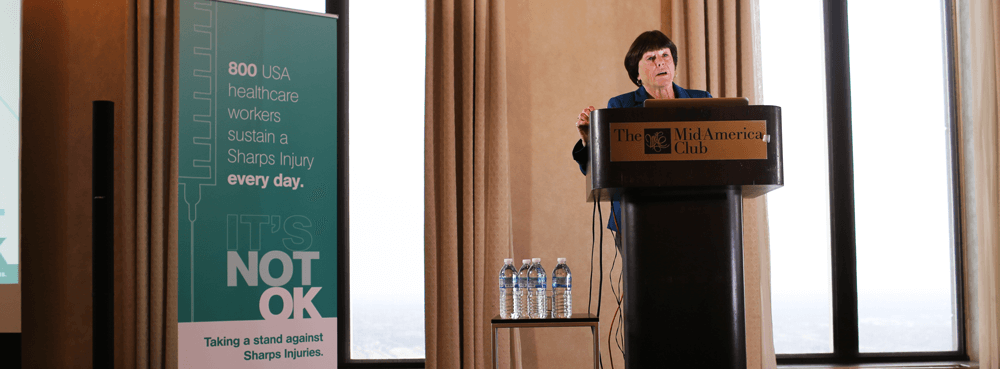Karen Daley: Needlestick Injury Survivor & Safety Advocate

In April this year I had the privilege of speaking with Karen Daley, former president of the American Nurses Association and needlestick injury survivor. Karen had joined two other prominent thought leaders in a speaking circuit across three States with a focus of bringing sharps injuries back to the forefront of clinical discussion.
Early on in her nursing career, Karen contracted HIV and Hepatitis C from a used syringe protruding from an overfilled sharps container, and today she stands as a vocal advocate for stronger safety standards, more consistent use of safety engineered devices, and a greater support structure for clinical staff who fall victim to needlestick injuries.
Karen, how has your life been impacted by a needlestick injury?
“In every possible way I can think of. It occurred at what I would consider the height of my career in terms of clinical nursing. I knew that the treatments would make it very difficult to continue my career because of the intense therapies for infection.”
Since the passing of the law in 2000, do nurses still perceive a sharps injury as a serious occupational risk?
“Nurses do perceive it as a serious occupational risk. I can tell you we have data collected between 2013 and 2016 by the American Nurses Association, and needlestick injuries were ranked #4 out of over 20 different options for nurses’ top concerns.”
Have advances in the treatment of HIV and Hepatitis C lessened the psychological impact of sharps injuries?
“I think that the advances and the therapies have been helpful, but they do not lessen the psychological impact that a sharps injury poses on someone. Once you’re exposed and sustain the injury, there is a possibility that you can become infected with one of more than 60 blood-borne pathogens, including HIV, Hepatitis B and Hepatitis C. It still makes you concerned that you could be at risk of getting one of those infections.”
Based on the recollections of nurses who have sustained a sharps injury, what are some key strategies for meeting their needs?
“I’ve talked to hundreds, if not thousands, of nurses who have gone through this experience. We support one another when injuries occur. If I’m a nurse on a unit and sustain a sharps injury, I would expect my peers, manager, and supervisor to do everything that is appropriate in terms of meeting my post-exposure needs.
Support following the injury is important for those who are prescribed the post-exposure prophylaxis. The drug’s side-effects have lessened since I got stuck, but it is still incredibly toxic. Without support, the individual who was stuck is at risk of not completing the course, which lessens the likelihood of protection if exposed and infected.”
What are some of the misunderstandings about sharps injuries and the post-injury protocol?
“People misunderstand that it is not necessarily whether or not one gets infected, it is the experience itself that is a horrible outcome. Furthermore the significance of the injuries and impact can sometimes be diminished by employers and others in the healthcare arena which puts further emotional pressure on the victim. The second misunderstanding relates to the drugs that may be recommended after exposure. They are tough drugs to take and nurses need support and follow-up by occupational health staff to ensure they are coping with the potential side-effects. Once the experience occurs, you realise that nursing is a pretty hazardous occupation in healthcare.
There is a misperception that once the experience is over, there is no value left behind. Engaging with nurses after the experience is critical because they can offer their personal experiences and insights when evaluating new devices or perhaps looking at areas in the unit or care arena where safety might be improved.”
“Karen believes her injury could have been prevented if a different type of sharps container been used as well as devices with retracting needles or protective sheath covers. She encourages all nurses to get involved at local, state, regional or national levels.”
We are grateful that Karen has openly shared her story and hope that it instills courage for others to come forward with their stories and use their testimonies to drive change in healthcare safety. Karen’s story reinforces our company’s ‘why’ – because behind the idea of safety, there are people, nurses, individuals who have dedicated their lives to support the healthcare of others that are at risk of having their own health jeopardised.
If you are interested in learning more about the It’s Not OK events and the other speakers, click here.
Let's Talk!
Your time is valuable, and we don’t want to play hard to get. You can either phone us directly on the details listed on our contact page, or feel free to fill out this short form and one of our team members will get back to you as quickly as possible.
